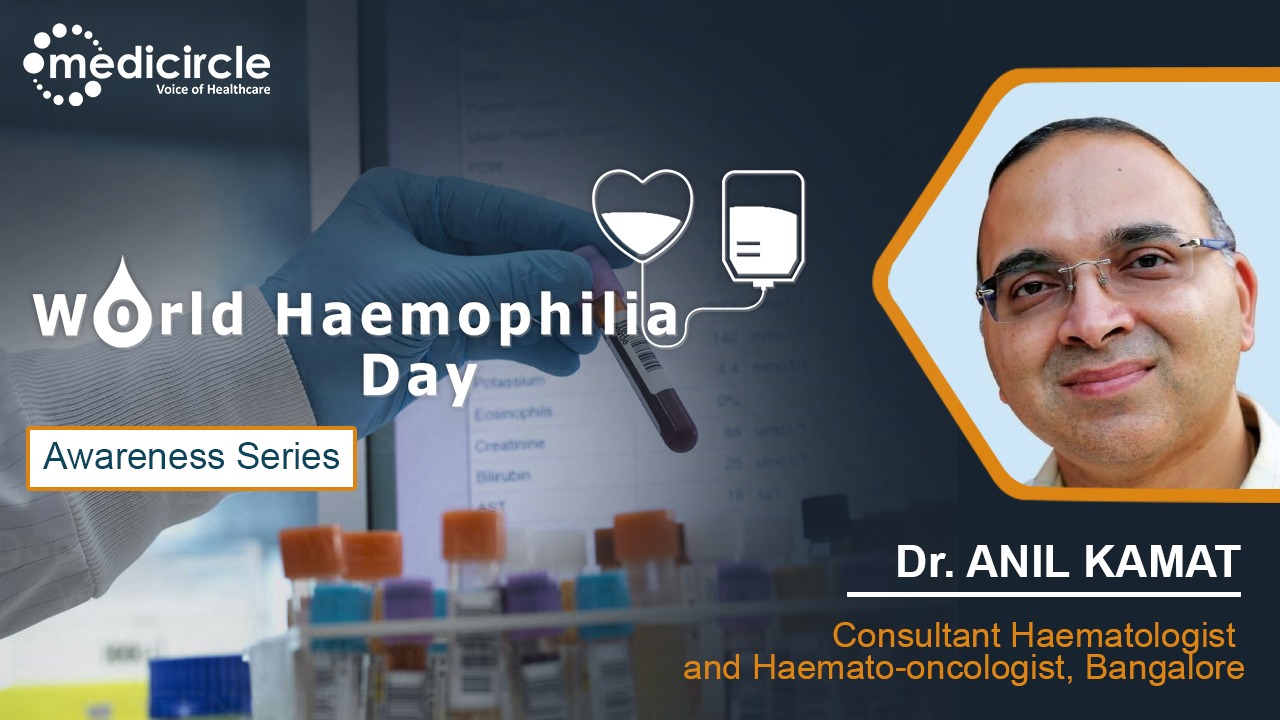Haemophilia is an inherited bleeding disorder that impairs the body’s ability to make clots. If you are suffering from hemophilia, you may bleed for a longer time which calls for special attention. Haemophilia is a deficiency of clotting factors that results in prolonged bleeding. In such cases, it is important to take necessary actions and precautions. On this World Haemophilia Day, we are speaking to eminent doctors and hematologists to create awareness about hemophilia disorders and their necessary precautionary measures.
Dr. Anil Kamat is a consultant hematologist and hemato oncologist at Jupiter hospital. He has about three decades of rich experience in the healthcare industry. He specializes in bone marrow transplant, hemophilia, thalassemia, stem cell transplantation, and blood transfusion. Dr. Anil has been a member of the American Society of Hematology and European Group for blood and marrow transplantation.
The real condition of hemophilia
Dr. Anil Kamat says, “Haemophilia is a rare condition which impairs the blood’s ability to clot. The clotting factors mixed with blood cells cause platelets that make the blood stick to form a clot. This is how bleeding stops. People with hemophilia do have these clotting factors. In Haemophilia A, there is a deficiency of the clotting factor 8. In Haemophilia B, there is prolonged bleeding. There is an inheritance of chromosome X which is carried by the mother or father, both. As you are aware that males have one X chromosome so it is usually the males who are affected with hemophilia.”
Specialized referenced centers for Haemophilia diagnosis
Dr. Kamat says, “The diagnosis of hemophilia is usually established in a reference center through the World Federation Haemophilia India Branch. There is also each state hemophilia division that will guide affected children or families to the right center. The diagnosis of hemophilia required a specialized blood test which is not routinely available in a pathology lab. These have to be available in specialized reference centers. In these specialized blood tests, we look for specific clotting factors such as 8 or 9 to confirm the diagnosis.
Symptoms of hemophilia
Dr. Kamat says, “The symptoms can be manifested at a very young age especially with no family history. A child who is just beginning to walk and crawl may develop symptoms. Some cases of hemophilia can be discovered later during a dental surgical procedure or injury.
In such cases, specific genetic and genomic testing is required. This test is called chorionic villus sampling or amniocentesis. This test can also be done at 11 - 14 weeks or 15-20 weeks of pregnancy. This can help identify the baby with hemophilia. These tests are done at specialized centers. This is applicable to families who have a strong history of hemophilia. One in three babies who are diagnosed with hemophilia tend to be from families who have no history.”
Treatment for hemophilia in India
Dr.Kamat informs, “Today in 2021, we have come a long way in terms of the treatment with plasma-based products and recombinant products. The treatment depends on severity too. In cases of mild hemophilia, the affected person may not require treatment regularly and maybe just symptomatic treatment when there is bleeding. However, moderate to severe hemophilia require treatment. Hemophilia treatment can be given as a prophylactic and when required. Prophylactic is giving infusions of medicines which is plasma-derived or recombinant which is more prevalent in the west. It is not easily available in India because of cost concerns. The most preferred treatment in India is recombinant treatment. For preventive treatment, it can be given two or three times a week and on-demand when the child or the person bleeds. A hematology consultant will be able to guide you the correct way with a tailor-made and personalized approach.”
Severity of hemophilia
Dr.Kamat says, “Small proportion of patients can have severe hemophilia. If hemophilia is not treated or diagnosed on time, it can lead to life-threatening complications. One of the severe complications is brain hemorrhage. This can result in hemorrhage, slurred speech, problems with coordination, and imbalance. This can be diagnosed early with a brain scan. Joint damage can also be prevented with effective replacement therapy. In some patients, inadequate treatment can lead to long-term complications such as permanent joint damage or joint replacement. A small proportion of hemophilia treatment can develop inhibitors where they develop resistance to these factors from the treatment. They require induction treatment which can be done at specialized centers. Hemophilia treatment is a comprehensive treatment.”
(Edited by Dr. Rati Parwani)

 Haemophilia is a comprehensive treatment according to Dr. Anil Kamat, consultant hematologist, hemato oncologist at Jupiter hospital. He provides details about the hemophilia causes, complications, and treatment
Haemophilia is a comprehensive treatment according to Dr. Anil Kamat, consultant hematologist, hemato oncologist at Jupiter hospital. He provides details about the hemophilia causes, complications, and treatment







.jpeg)


.jpg)









.jpeg)





.jpg)




.png)



